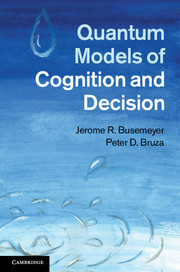Book contents
- Frontmatter
- Contents
- Preface
- Acknowledgments
- 1 Why use quantum theory for cognition and decision? Some compelling reasons
- 2 What is quantum theory? An elementary introduction
- 3 What can quantum theory predict? Predicting question order effects on attitudes
- 4 How to apply quantum theory? Accounting for human probability judgment errors
- 5 Quantum-inspired models of concept combinations
- 6 An application of quantum theory to conjoint memory recognition
- 7 Quantum-like models of human semantic space
- 8 What about quantum dynamics? More advanced principles
- 9 What is the quantum advantage? Applications to decision making
- 10 How to model human information processing using quantum information theory
- 11 Can quantum systems learn? Quantum updating
- 12 What are the future prospects for quantum cognition and decision?
- Appendices
- References
- Index
Acknowledgments
Published online by Cambridge University Press: 05 August 2012
- Frontmatter
- Contents
- Preface
- Acknowledgments
- 1 Why use quantum theory for cognition and decision? Some compelling reasons
- 2 What is quantum theory? An elementary introduction
- 3 What can quantum theory predict? Predicting question order effects on attitudes
- 4 How to apply quantum theory? Accounting for human probability judgment errors
- 5 Quantum-inspired models of concept combinations
- 6 An application of quantum theory to conjoint memory recognition
- 7 Quantum-like models of human semantic space
- 8 What about quantum dynamics? More advanced principles
- 9 What is the quantum advantage? Applications to decision making
- 10 How to model human information processing using quantum information theory
- 11 Can quantum systems learn? Quantum updating
- 12 What are the future prospects for quantum cognition and decision?
- Appendices
- References
- Index
Summary

- Type
- Chapter
- Information
- Quantum Models of Cognition and Decision , pp. xv - xviPublisher: Cambridge University PressPrint publication year: 2012

